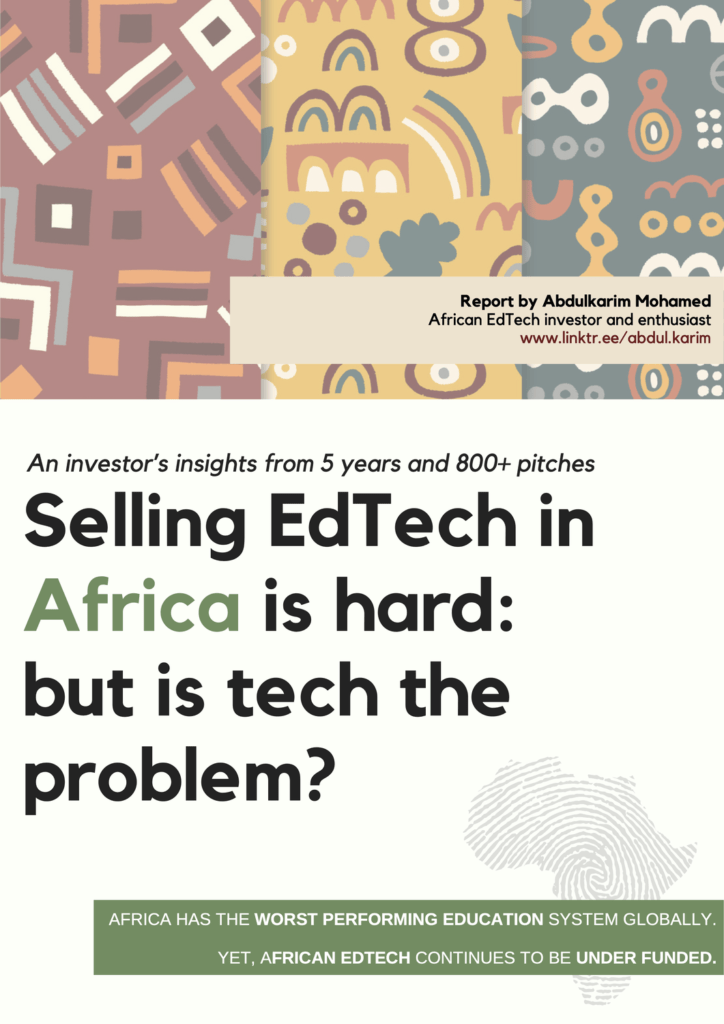Selling EdTech in Africa is hard : but is tech the problem?
Selling EdTech in Africa presents unique challenges despite the continent's growing population and the perceived importance of education. Abdul-Karim Mohamed, an African startup investor, explores the reasons behind the underfunding of EdTech ventures in Africa and questions whether technology itself is the issue.

By Abdul-Karim Mohamed*

Africa’s education system is the worst performing globally, yet consistently African EdTech ventures attract less than 2% of total venture financing in the region. In comparison, EdTech ventures in India typically attract investor capital at a rate 6X higher; 8-12% of total venture financing.
Most African investment presentations rave about the continent’s growing and youthful population. The population in Africa is expected to grow by 90% by 2050. As most countries globally face a decline in population, Africa’s working-age population will become larger than that of both India and China.
As a former Investment Director of a $10M EdTech fund in East Africa, commercializing EdTech was always top of mind. The fund’s investments now benefit over 11 million children, 100,000+ teachers and tutors, and nearly 7,000 schools across 10 African markets. Despite this early success, selling EdTech in Africa remains a challenge, especially at the pre-primary to secondary education levels (i.e., K-12 education).
The lack of funding is puzzling because education in Africa has compelling forces that make it ripe for commercial success:
- Big Market Size: By 2050, 25% of all children born globally will be in Africa.
- High Value Perception: More than 40% of Africans believe education is the most important input for a successful life. In Ghana and Botswana, education is believed to be seven times more important than family/friend connections.
- Market Failure: Currently, 90% of children in Africa do not achieve basic reading and numeracy skills by age ten. The upper secondary completion rate remains at only 33%.
- High Willingness to Pay: In Kenya’s most recent fiscal budget, education saw the largest share of government spending (26%, compared to just 3-4% for OECD countries). African households cover 40% of the total cost of educating their children, compared to only 16% for households in higher-income countries. Behind food, education is often the second biggest household expenditure.
Why is Africa, home to some of the world’s most challenging educational environments, still underfunding EdTech startups?
Five years ago, I joined Acumen to launch and lead a $10M African EdTech Fund.
Early in my tenure, I crafted a 29-page deck titled ‘Challenges and Opportunities for Entrepreneurs in Education‘ and hit the road, visiting tech hubs, accelerators, and incubators. My mission: inspire entrepreneurs to develop education products by spotlighting untapped market opportunities.
Today, I’m excited to share my latest report, ‘Selling EdTech in Africa is hard: but is tech the problem?’ (download link below). This 20+ page sequel draws from my experience building Africa’s largest K-12 EdTech fund.
It’s a narrative journey through five years of reviewing over 800 pitch decks, exploring effective (and ineffective) business models and distribution channels, and featuring 13 innovative African EdTech ventures making strides in the K-12 space.
Investors and donors: Pickup a coffee and read this report (the executive summary is a 5 minute read; the full report 45 minutes). It will transform your understanding of K-12 African EdTech, taking you from novice to knowledgeable. The importance of education in Africa is undeniable.
EdTech entrepreneurs: Use the lessons and observations in this report to iterate and succeed faster. While it doesn’t provide all the answers, it sheds light on what works and what doesn’t. As investors, we believe in a world shaped by entrepreneurs.

Download the Full Report for free here.
*African startup investor






